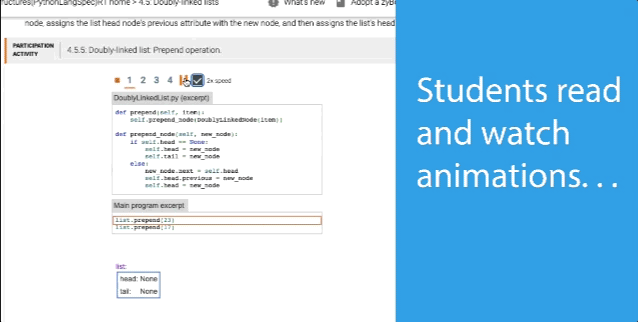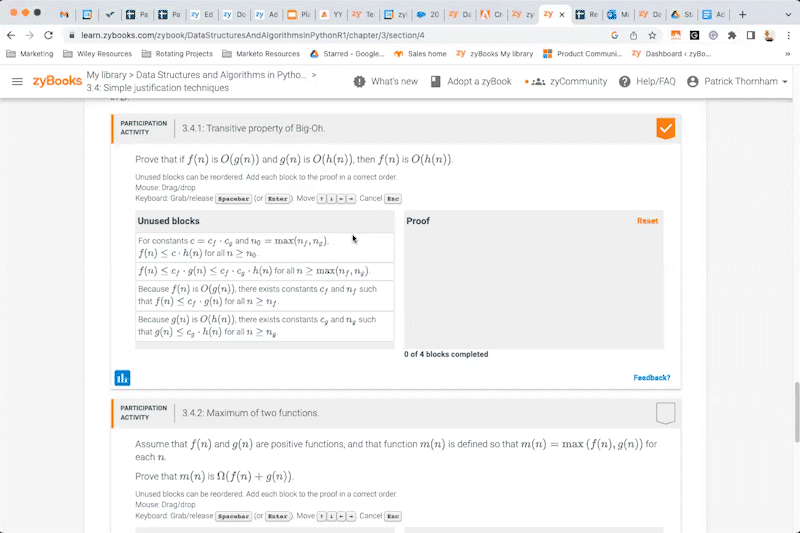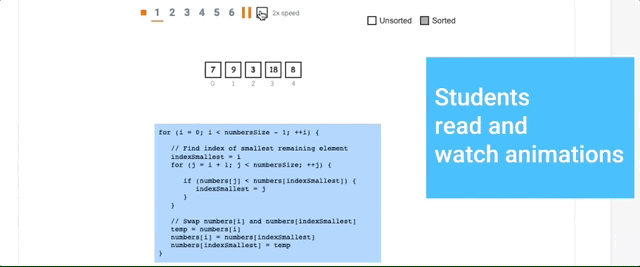Choosing Data Structures Content for CS Instructors – zyBooks Guide
zyBooks offers 8 distinct data structures titles across multiple programming languages and approaches. See the key differences to select the optimal content to meet your course needs and student population.

Explore our titles:
1. Language-Specific Data Structures
Data Structures in Python, Java, or C++ (zyBooks)
- Focus: Introduces the basics of algorithms and data structures, including sorting, runtime complexity, lists, stacks, queues, hash tables, trees, and graphs
- Exercise variety: Contains autograded reading questions, homework questions, animations, and optional integrated programming labs.
- Content Depth: 12 chapters with a strong memory management focus
- Activity Count: 700+ participation activities, 150+ programming challenges
2. Comprehensive Algorithm Coverage
Data Structures & Algorithms in Python, Java, or C++ (Goodrich, Tamassia, Goldwasser)
- Academic Pedigree: Contains the complete, most recent edition of the authors’ content, which is based on their market-leading data structure books in Java and C++
- Comprehensive Coverage: Offers a comprehensive introduction to data structures and algorithms, including their design, analysis, and implementation
- Enhanced Features: Includes interactive animations that enhance learning with step-by-step dynamic illustrations of algorithms, data structure operations, and other key concepts
- Content Depth: 15 chapters, including advanced topics like memory management and external algorithms
- Modern Standards: Extensive C++ source code is consistent with modern C++/STL standards; the entire codebase is available online
3. Language-Agnostic Approach
Data Structures in Pseudocode (with C++, Java, Python examples)
- Universal Concepts: Language-independent pseudocode is used to help learners master fundamental concepts
- Multi-Language Support: Contains language-independent pseudocode to ensure mastery of the fundamental concepts. “With-examples” versions also include many programming-language-specific code examples for most topics.
- Flexibility: Ideal for courses that switch languages or want a conceptual focus
- Activity Count: 1,000+ learning questions and animations
4. Specialized Focus
Algorithm Design and Applications (Goodrich)
- Advanced Focus: Primarily algorithm-focused rather than data structure implementation
- Target Audience: Upper-level courses emphasizing algorithmic thinking

Recommendation Framework
Choose “Data Structures in [Language]” if:
- Teaching a CS2-level data structures course
- Prefer zyBooks’ native interactive approach
- Required language is C++, Java, or Python

Choose Goodrich “Data Structures & Algorithms in [Language]” if:
- Need comprehensive theoretical coverage
- Teaching an upper-level undergraduate course
- Want established academic textbook content – Goodrich
- Strong mathematical foundation that includes Discrete Mathematics and/or Calculus

Choose “Data Structures in Pseudocode” if:
- Want language-agnostic conceptual focus
- Need flexibility to switch implementation languages
- Prefer algorithmic thinking over language-specific details

Implementation Support
- Live and on-demand onboarding
- LMS Integration
- Assessment tools
- Customization
Student Engagement Features
Mobile-compatible for flexible access
Built-in programming environments eliminate setup barriers
Auto-graded activities provide immediate feedback
Progress tracking helps identify struggling students
Beyond Content Selection – Implementation Essentials:
📋 Technical Requirements & Support
- System requirements and browser compatibility: zyBooks Support Site
- Accessibility compliance and technical specifications available online
⚖️ Academic Integrity Features
- Comprehensive academic integrity policies and tools: zyBooks Academic Integrity
- Built-in plagiarism detection and question randomization capabilities
🔗 Learning Management System Integration
- Detailed LMS compatibility and setup guides: LTI Integration Support
- Canvas, Blackboard, Moodle, D2L, and other major platforms supported
📊 Research & Efficacy Data
- Student outcome studies and learning effectiveness research: zyBooks Research Library
- Peer institution case studies and adoption success stories
🎯 Implementation Support
Timeline expectations and change management assistance
Faculty training, onboarding, and ongoing support resources: Instructor Support Center
If you have any comments or want to share data structures teaching strategies you use in your own courses, we’d love to hear from you! Email us at officehours@zybooks.com.





